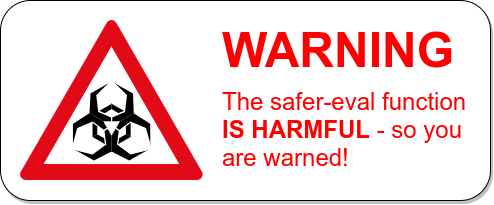harmful as eval
This approach has proven to be HARMFUL and does not suit as repacement for eval in node and browser.
Before using this module, ask yourself if there are no better options than using saferEval.
It is potentially better than the bad old eval() but has harmful potential.
Checkout the "harmful context" tests section.
Warning: The saferEval function is harmful - so you are warned!
Better packages:
- For node check vm2.
If you like to post exploits you found on this module, feel free to do so. Please file an issue with your findings.
Maybe this helps then others to build a better sandbox.
In node the vm module is used to sandbox the evaluation of code.
The browser version browser.js might not be as safe as the node version
index.js as here no real sandboxing is available. Please consider modules like
sandboxr.
Runs on node and in modern browsers:
| Versions | |
|---|---|
| node | 8, 10, 11, 12 |
| Chrome | 70, 75 |
| Firefox | 60, 68 |
| Edge | 17, 18 |
| IE | |
| Safari | 11, 12 |
| iOS Safari | 11.3, 12.0 |
npm install --save safer-eval
Use strict mode
Always use 'use strict' mode in functions/ files calling saferEval().
Otherwise a sandbox breakout may be possible.
'use strict'
const saferEval = require('safer-eval')
function main () {
'use strict' //< alternative within function
const res = saferEval('new Date()')
...
}Run in worker
Be aware that a
saferEval('(function () { while (true) {} })()')may run infinitely. Consider using the module from within a worker thread which is terminated after timeout.
Avoid context props
Avoid passing context props while deserializing data from hostile environments.
context allows the definition of passed in Objects into the sandbox.
Take care, injected code can overwrite those passed context props!
Check the tests under "harmful context"!
Parameters
code: String, a string containing javascript code
context: Object, define globals, properties for evaluation context
Returns: Any, evaluated code
Example:
in node:
'use strict' //< NEVER FORGET TO ADD STRICT MODE in file/ function
//< running `saferEval`
const saferEval = require('safer-eval')
const code = `{d: new Date('1970-01-01'), b: new Buffer('data')}`
const res = saferEval(code)
// => toString.call(res.d) = '[object Date]'
// => toString.call(res.b) = '[object Buffer]'in browser:
'use strict' //< NEVER FORGET TO ADD STRICT MODE in file/ function
//< running `saferEval`
const saferEval = require('safer-eval')
const code = `{d: new Date('1970-01-01'), b: function () { return navigator.userAgent }`
const res = saferEval(code, {navigator: window.navigator})
// => toString.call(res.d) = '[object Date]'
// => toString.call(res.b) = '[object Function]'
// => res.b() = "Mozilla/5.0 (..."To minimize any harmful code injection carefully select the methods you allow in context
const code = `window.btoa('Hello, world')`
// AVOID passing a GLOBAL context!!!
const res = saferEval(code, {window: window})
// BETTER - code needs only access to window.btoa
const clones = require('clones')
const context = {
window: {
btoa: clones(window.btoa, window)
}
}
const res = saferEval(code ,context)
// => res = 'SGVsbG8sIHdvcmxk'Use new SaferEval() to reuse a once created context.
'use strict' //< NEVER FORGET TO ADD STRICT MODE in file/ function
//< running `saferEval`
const { SaferEval } = require('safer-eval')
const safer = new SaferEval()
const code = `{d: new Date('1970-01-01'), b: new Buffer('data')}`
const res = safer.runInContext(code)